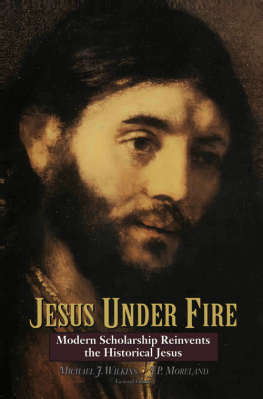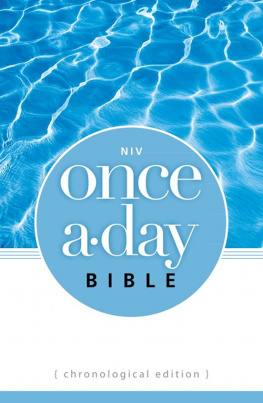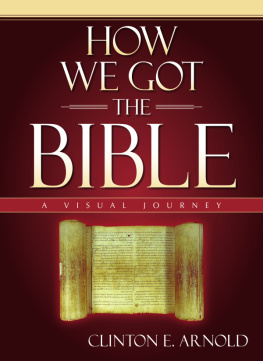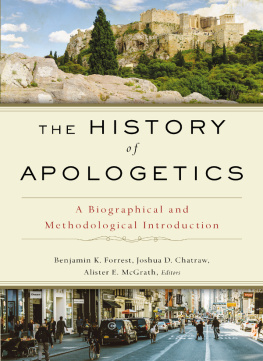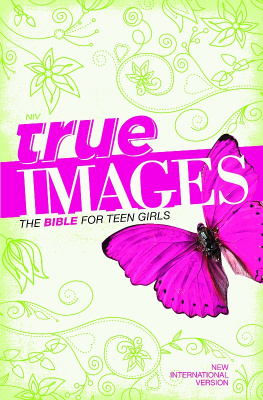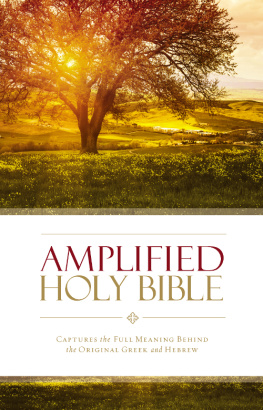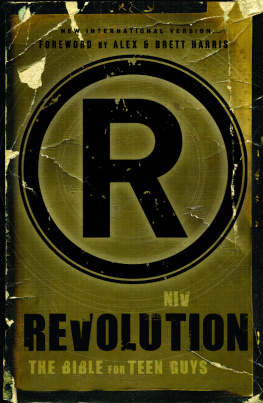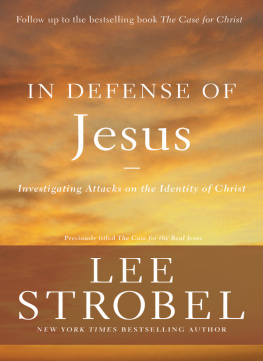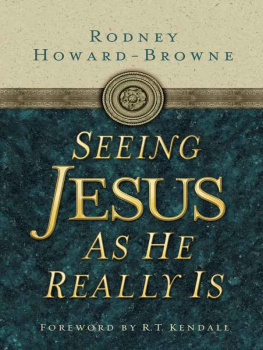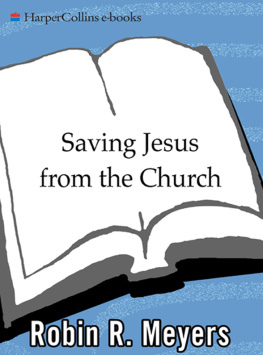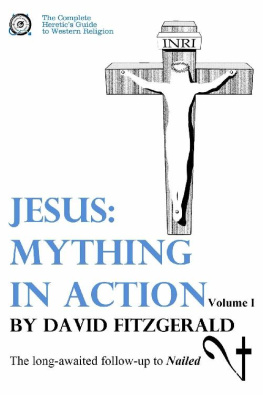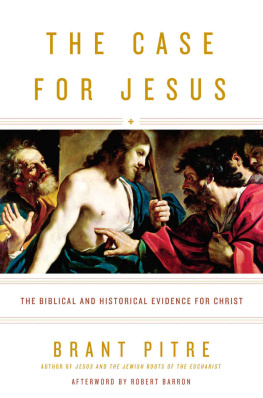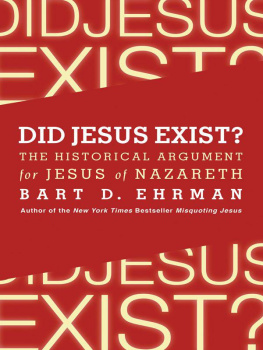once for all delivered to the saints.
S pecial thanks go to a number of people who have helped make this book possible. First, we are grateful to the fellow authors of this volume for the spirit and passion they brought to this project. When we initially contacted each about contributing to the book, they indicated that they were already overtaxed with research, writing, and teaching; yet they understood the significance of our endeavor and immediately agreed to be a part of our team and to make their chapter a priority.
Second, we are grateful to Roberta and Howard Ahmanson and the Fieldstead Foundation for a grant to Biola University that helped to make our editorial work possible. May God richly bless them and other Christians who use their resources to advance the kingdom of God.
We are also indebted to Zondervan Publishing House, specifically Stan Gundry, Ed van der Maas, and Verlyn Verbrugge, who streamlined the process in record time to get this book out into the hands of people who need to read it.
We also wish to thank our Dean, Dennis Dirks, along with the faculty and students at Talbot School of Theology, Biola University. Together they have provided support for the book and an intellectually and spiritually rich environment in which to work. Our energy for this project came from many of them.
Finally, we want to thank our wives and children. Their love for us and their joint commitment to the cause of Christ are our constant source of nourishment and strength.
Craig L. Blomberg (Ph.D., University of Aberdeen), Associate Professor of New Testament, Denver Seminary.
Darrell L. Bock (Ph.D., University of Aberdeen), Professor of New Testament studies, Dallas Theological Seminary.
William Lane Craig (Ph.D., University of Birmingham, England; Th.D., University of Munich, Germany), Visiting Scholar, Emory University.
Craig A. Evans (Ph.D., Claremont Graduate School), Professor of biblical studies, Trinity Western University, Langley, British Columbia.
R. Douglas Geivett (Ph.D., University of Southern California), Associate Professor of philosophy, Talbot School of Theology, Biola University.
Gary Habermas (Ph.D., Michigan State University; D.D., Emmanuel College, Oxford), Distinguished Professor of apologetics and philosophy and Chairman of philosophy and theology, Liberty University.
Scot McKnight (Ph.D., University of Nottingham), Associate Professor of New Testament, Trinity Evangelical Divinity School.
J. P. Moreland (Ph.D., University of Southern California), Professor of philosophy, Talbot School of Theology, Biola University.
Michael J. Wilkins (Ph.D., Fuller Theological Seminary), Dean of the Faculty and Professor of New Testament language and literature, Talbot School of Theology, Biola University.
Edwin Yamauchi (Ph.D., Brandeis University), Professor of history, Miami University in Oxford, Ohio.
ABRLAnchor Bible Reference Library
AJTAmerican Journal of Theology
ANRWAufstieg und Niedergang der rmischen Welt
BARBiblical Archaeology Review
BETLBibliotheca ephemeridum theologicarum lovaniensium
BABiblical Archaeologist
BJRLBulletin of the John Rylands Library
BBRBulletin of Biblical Research
BRBible Review
CBQCatholic Biblical Quarterly
CTQConcordia Theological Quarterly
CTChristianity Today
EvQEvangelical Quarterly
HTKNTHerders theologischer Kommentar zum neuen Testament
HTRHarvard Theological Review
ISBEInternational Standard Bible Encyclopedia
JBLJournal of Biblical Literature
JETSJournal of the Evangelical Theological Society
JHSJournal of Historical Studies
JJSJournal of Jewish Studies
JAOSJournal of the American Oriental Society
JRHJournal of Roman History
JRSJournal of Roman Studies
JSNTJournal for the Study of the New Testament
JSNTMSJournal for the Study of the New Testament Monograph Series
JSOTJournal for the Study of the Old Testament
LCLLoeb Classical Library
NICNTNew International Commentary on the New Testament
NovTNovum Testamentum
NTSNew Testament Studies
NTTSNew Testament Tools and Studies
SBTStudies in Biblical Theology
SJTScottish Journal of Theology
Tnn JTrinity Journal
TSTheological Studies
TynBulTyndale Bulletin
TZTheologische Zeitschrift
WTJWestminster Theological Journal
MICHAEL J. WILKINS AND J. P. MORELAND
J esus of Nazareth is under fire. Although he came on the scene of history nearly two thousand years ago, Jesus continues to be the object of devotion and controversymuch as he was when he first walked the landscape of Palestine. Many people today still acclaim him as Savior, as did his followers in the first century. And many others today still reject his claims and consider him a threat to the religious and political establishment, as did the religious and governmental leaders of Israel and Rome.
Jesus Under Fire
But Jesus is under fire in a different way now. Today some declare that Jesus never said most of what is recorded of him in the Bible. Some pronounce further that Jesus never did most of what the Bible records he did. They claim that Jesus of Nazareth was a far different figure than church history and the creeds have believed him to be. Therefore, if we are to be intelligent people, even intelligent religious people, we must not simplistically accept what the Bible records Jesus claimed for himself and what the early church claimed him to be. If we are to be truly modern in our religious quest, we must not simplistically hope that Jesus actions as they are recorded in the Bible are factual, or that they have any relevance for us today. Jesus must be stripped of ancient myths that surrounded him as to what he said and did, so that the modern person can hear his true message. Jesus must be brought down to earth from the status to which the early church elevated him, so that we can understand who he was as he walked under Palestinian skies and comprehend what, if any, religious relevance he has for us today. To many today, the Jesus of Nazareth we find in the pages of the Bible is a fictitious creation of the early church, and he must be exposed for who he truly is if he is to have any value for people who face the twenty-first century.
Jesus of Nazareth and the Modern Worldview
At issue with this perspective on Jesus is whether the worldview reflected in the Bible is viable in the scientific age as an article of reasoned faith. The advent of historical reason in the modern era means that we are obligated to distinguish between factual and fictional accounts of the past. Just as scientific advances in medicine, astronomy, agriculture, and physics swept away old superstitions and myths, so the application of scientific methods of investigation to Jesus of Nazareth is bound to sweep away archaic religious beliefs. The Christ of creed and dogma in the Middle Ages is thus said to be viable no longer for people who have witnessed the scientific revolution.

